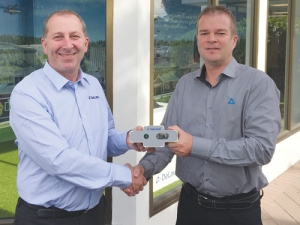LIC lifts half-year revenue on strong demand for dairy genetics
Herd improvement company LIC has posted a 5.2% lift in half-year revenue, thanks to increasing demand for genetics.
 DeLaval Oceania regional president Andrew Pooch (left) and LIC Automation sales and marketing manager Lester Deighton with the 3D camera.
DeLaval Oceania regional president Andrew Pooch (left) and LIC Automation sales and marketing manager Lester Deighton with the 3D camera.
An automated body condition scoring system for New Zealand-bred cows will be launched at National Fieldays next month.
The technology, a world first, combines DeLaval's BCS camera system with LIC Automation's technology and knowledge of NZ herd characteristics.
DeLaval Oceania regional president Andrew Pooch says it is pleased to be cooperating with LIC Automation.
"It eliminates commercial barriers and will offer all NZ dairy farmers opportunity for body conditioning scoring to be fully automated, eliminating the guesswork and labour hours associated with a manual system.
"This could not be more timely with the new animal evaluation process in place in NZ since February 2016 making BCS trait mandatory for bull evaluation."
LIC Automation sells services and solutions such as dairy genetics and information, says Paul Whiston, chief executive.
"Collaboration in innovative technology... increases productivity and prosperity onfarm. Automating the body condition scoring process will deliver greater consistency and [finer] data to farmers to assist in their decisionmaking and herd management."
The DeLaval BCS is based on a 3D camera; when a cow passes under the camera the system recognises the movement and selects the best still image of the cow in the video sequence. The image is converted into an accurate BCS and can be accessed via DeLaval's herd management system DelPro or LIC's herd management system Minda.
The DeLaval BCS condition scoring allows the farmer to plan and optimise feeding according to a cow's BCS score, ensuring they have peak body condition in the lactation cycle.
Keeping cows at ideal condition during lactation ensures maximum milk yield, improves pregnancy rate and minimises calving and post calving problems, the company says.
The World Wide Sires National All Day Breeds Best Youth Camp Best All Rounder plaudit has become family affair, with 2026 Paramount Cup winner Holly Williams following in her sister Zara's footsteps.
DairyNZ is giving New Zealand farmers a unique opportunity to gain hands-on governance and leadership experience within the dairy sector.
Herd improvement company LIC has posted a 5.2% lift in half-year revenue, thanks to increasing demand for genetics.
According to the latest Fresh Produce Trend Report from United Fresh, 2026 will be a year where fruit and vegetables are shaped by cost pressures, rapid digital adoption, and a renewed focus on wellbeing at home.
The Roar is a highlight of the game hunting calendar in New Zealand, with thousands of hunters set to head for the hills to hunt male stags during March and April.
OPINION: The past few weeks have been tough on farms across the North Island: floods and storms have caused damage and disruption to families and businesses.
OPINION: Fonterra may be on the verge of selling its consumer business in New Zealand, but the co-operative is not…
OPINION: What does the birth rate in China have to do with stock trading? Just ask a2 Milk Company.